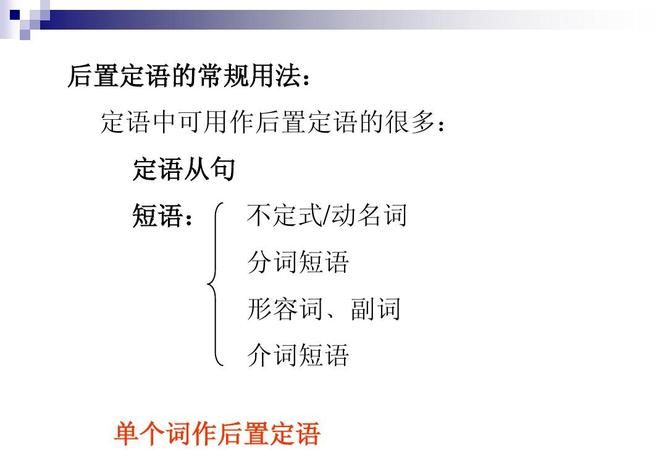本文目录
单个过去分词作后置定语
过去分词作定语时,通常可替换某些定语从句.此时要注意两点:首先,在被替换的定语从句中,主语必须是作从句主语的关系代词;其次,定语从句中的谓语动词通常使用表示已经完成的时态或被动语态.
例如:
1.Prices of daily goods_through a computer can be lower than store prices.(2002北京春招)
A.are bought B.bought C.been bought D.buying
思路分析:此题考查过去分词短语作后置定语的用法.我们可以把bought through还原成一个定语从句:Prices of daily goods that are bought through a computer...可知最佳答案为B项.
2.The managers discussed the plan that they would like to see_the next year.
A.carry out B.carrying out C.carried out D.to carry out
思路分析:此题考查see sb./sth. done句型.因the plan与carry out逻辑上是被动关系,故答案为C,其中that引导了一个定语从句.
3.The Olympic Games,_in 776 B.C.,did not include women players until 1912.
A.first playing B.to be first played C.first played D.to be first playing
思路分析:the Olympic Games与play之间是被动关系,故排除A、D项.B项是不定式的被动式,表示"未来",也可排除,因此,C项是对的.它相当于一个非限制性定语从句which were first played.
4.The first text books_for teaching English as a foreign language came out in the 16th century.
A.having written B.to be written C.being written D.written
思路分析:A项不能作后置定语,B项表示未来的动作,C项表示正在进行的动作.text books与write之间是被动关系,而且原题中的the first text books与came out in the 16th century也可暗示考生选written,表被动且完成的意思,故答案为D项.
过去分词作定语有前置和后置两种情况。
1、前置定语
单个的过去分词作定语,通常放在被修饰的名词之前,表示被动和完成意义。
A类:被动意义:
an honored guest 一位受尊敬的客人
The injured workers are now being taken good care of in the hospital.
受伤的工人现正在医院受到良好的照料。
B类:完成意义:
a retired teacher 一位退休的教师
They are cleaning the fallen leaves in the yard.
他们正在打扫院子里的落叶。
2、后置定语
过去分词短语作定语时,通常放在被修饰的名词之后,它的作用相当于一个定语从句。如:
This will be the best novel of its kind ever written (=that has ever been written).
这将是这类小说中写得最好的。
Who were the so-called guests invited (=who had been invited) to your party last night?
昨晚被邀请参加你的晚会的那些所谓的客人是谁呀?

现在分词短语作后置定语句子
单个词作定语限定修饰名词要放在其前面,叫前置定语
如果是短语就要放在其后,叫后置定语.
分词包括现在分词和过去分词,又称为非谓语动词,
可以做定语,如果是短语就要后置.
he
walked
in
the
street,
followed
by
his
son.
he
walked
in
the
street,
following
his
son.

关于动词的非谓语形式 现在分词 过去分词做后置定语的英语句子
1.非谓语形式:不定式做后置定语,表示将要做(还没有做)
I have something (to do this evening).
2.现在分词做定语时,位置不定,如果是一个现在分词,前置,如果是短语后置.表主动.
The boy (sitting by the window )is Tom.
3.过去分词作定语和现在分词相同,如果是一个过去分词,前置,如果是短语后置.表被动.
The boy (named Tom )was hurt in the car accident.

英语定语后置句怎么判断
一、 形容词作复合不定代词的后置定语
当被修饰词为复合不定代词something, anything, nothing, everything; somebody, anybody, nobody, everybody; someone, anyone, everyone, no one时,修饰语常位于被修饰的不定代词之后。
(1) Do you have anything else to say about it?
关于这件事,你还有什么要说的吗?
(2) I have something important to tell you.
我有些重要的事情要告诉你。
(3) Someone important will give the students a lecture on how to learn English well.
今天下午,一位重要的人物将给学生们做一场有关如何学好英语的报告。
二、 形容词作疑问词的后置定语
修饰疑问词what, which, who, whose, whom, when, where, why, how时,修饰语要后置。
(1) What important would you like to talk about?
你想谈论什么重要的事情?
(2) What else would you like to eat?你还想吃什么?
(3) Where new have they decided to visit?
他们决定到哪些没有去过的地方参观?
三、 enough作后置定语
enough(a.)修饰名词时既可以在名词前,也可以在名词后。
(1) We have not enough time (time enough) to do the job.
我们没有足够的时间做该工作。
(2) They have enough people(people enough)to do the experiment.
他们有足够多的人手做这个实验。
但enough(adv.)修饰形容词或副词时,须位于被修饰的形容词或副词之后。例如:good enough (足够好的),big enough(够大的),fast enough(够快),carefully enough(足够仔细)。
四、 介词短语作后置定语
the map on the wall 墙上的地图
the bird in the tree 树上的那只小鸟
the development of China 中国的发展
the way to the school 去学校的路
the life in the future 未来的生活
五、 动词不定式作后置定语
1.在某些名词结构中可用动词不定式作后置定语。
(1) He has lots of things to do.他有很多事情要做。
(2) Jack needed someone to carry the box.
杰克需要人来搬这个箱子。
(3) She always the first one to arrive at the school.
她总是第一个到达学校。
(4) There are a lot of things to do. 有许多事情要做。
2. 在某些名词后可用动词不定式作定语。
例如:ability, decision, chance, courage, right,determination, promise, ambition, drive, effort, eagerness, failure, movement, need, opportunity, plan, reason, struggle, time, way, wish,等等。
(1) I don’t have the courage to tell you the truth.
我没有勇气告诉你事实。
(2) Does he have the ability to do the work?
他有能力干这项工作吗?
(3) You have no right to do such a thing!
你没有权利做这样的事!
(4) I’ll show you my determination to stop smoking.
我将向你们表明我戒烟的决心。
六、 分词短语作后置定语
1. 现在分词短语作后置定语。
(1) There is a dog lying on the ground.
有只小狗躺在地上。
(2) The girl sitting by my side is my sister.
坐在我旁边的是我妹妹。
(3) Here is a map showing you how to get to the railway station.
这儿有一张地图,告诉你怎样去火车站。
2. 过去分词短语作后置定语。
(1) This is a film directed by Feng Xiaogang.
这是一部由冯小刚导演的电影。
(2) She is a nurse trained by ourselves.
她是我们自己培养的护士。
(3) What is the language spoken in Spain?
西班牙使用的是什么语言?
3. 部分过去分词也可以作后置定语。
例如:left, gained, used, offered, discussed, ordered, wounded, injured, concerned, conducted, done, held, arranged, planned, suggested, finished, completed, arrested, given, fallen, constructed, missed,等等。
(1) Is there anybody injured?有人负伤吗?
(2) The money left is not enough for so many people to live through.
剩余的钱不够这么多人用的。
(3) She liked all the courses offered.
她对所开的课程都很喜欢。
(4) The experience gained will be of great value to us.
取得的经验将对我们很有价值。
七、定语从句作后置定语
1. 定语从句作后置定语的构成是:
先行词+关系代词/副词+从句。引导定语从句的关联词包括关系代词和关系副词,关系代词有:that,which,whose,who,whom,as,等等。关系副词有:when,where,why,等等。关系代词和关系副词在定语从句中充当一定的句子成分(可充当主语,宾语,标语等句子成分)。
注意:关系代词在从句中充当动词的宾语时一般可以省略。
(1) The student who answered the question was Jack.
回答问题的这个学生是杰克。
(2) The boy (whom) you are talking to is my brother.
在跟你交谈的那个男孩是我的哥哥。
2. 关系代词的选用比较复杂,受下列条件的制约:
① 要看先行词是指人还是指物。
People who take physical exercise live longer.
进行体育锻炼的人活得长些。
② 要看关系代词在从句中句法功能。
I still remember the day when/on which my brother joined the army.(作状语)
我仍然记得我哥哥参军的那一天。
I still remember the days which/that we spent together.(作宾语)
我仍然记得我们在一起度过的日子。
I’d like a room whose window looks out over the sea.(作定语)
我想要一间窗户朝向大海的房间。

扩展资料
有时,to do也可以做后置定语。例如:I have some homework to do。我有一些要做的作业.
注意若在to do的句子中,to do不是表示目的状语或补语,那么to do很可能就是后置定语
参考资料来源:百度百科-后置定语
以上就是关于动词分词做后置定语例句 ,单个过去分词作后置定语的全部内容,以及动词分词做后置定语例句 的相关内容,希望能够帮到您。
